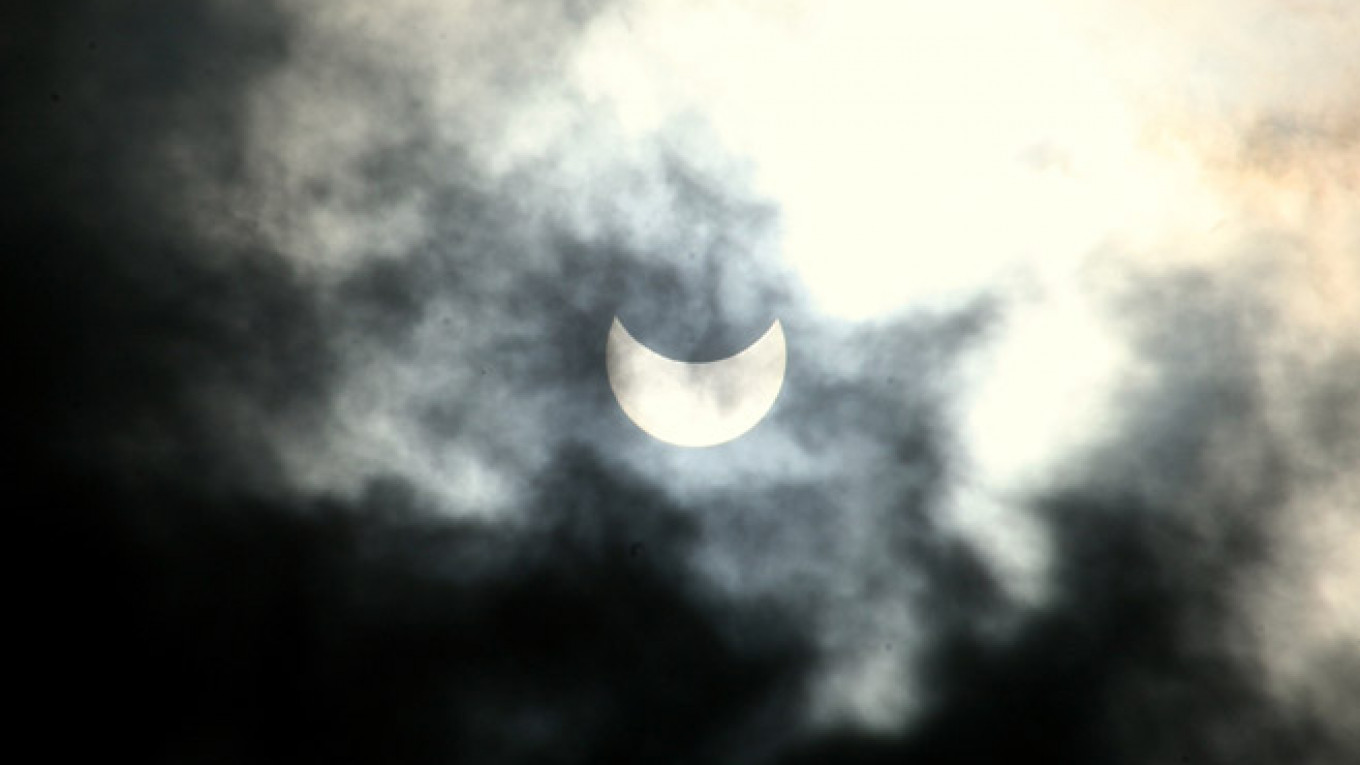The sky will go dark on Friday when a rare solar eclipse blocks the sun. Darkness will be complete in the Faroe Isles in the North Atlantic and in the Svalbard archipelago in the Arctic Sea, while much of Europe, including Moscow, will experience a partial eclipse.
If the weather is clear, Muscovites will see the moon hide 65 percent of the sun, according to the Moscow Planetarium website. The eclipse will begin at 12:13 p.m. and reach its fullest at 1:20 p.m. before retreating again until the sun is completely visible again at 2:27 p.m. Forecasts predict few clouds for Moscow on Friday.
The eclipse this year coincides with the March equinox when the length of night and day are equal.
Clear skies permitting, the best place to watch the eclipse in Russia is in the Arctic city of Murmansk, where the moon will cover up 85 percent of the sun. The Murmansk weather isn't likely to be as good as in Moscow, with some snow and clouds predicted.
Friday's eclipse is the biggest since 1999, a time so long ago that Vladimir Putin was not in charge of Russia. If you miss Friday's eclipse, you will have to wait till 2026 for the next one, when Putin — even if he wins another term — will not be president of Russia. Probably.
Eclipses are often seen as an omen. One of the first descriptions of an eclipse in Russia is in the epic 12th-century poem "The Tale of Igor's Campaign." The eclipse is seen before Prince Igor sets out on his raid against the Polovtsians of the Don River region. He fails, with some scholars seeing the eclipse as a warning for him not to have set out on his unsuccessful journey.
The Axe Russia deodorant, which cheekily claims it is general sponsor of the eclipse, presumably without any negotiations with either the sun or the moon, has sent a camera crew to Spitsbergen, the only populated island on the Svalbard archipelago, to film the total eclipse, which will be shown at 7 p.m. on a huge screen on Novy Arbat and on their YouTube channel.
Moscow's planetarium is opening its doors for people who want to watch the eclipse in its large observatory. It will also screen eclipses from all over the world and beam the eclipse onto its dome in the evening.
Telescopes have been set up near the Cosmonautics museum near VDNKh metro station for people to look at the eclipse, and a lecture will be held in the museum at 3 p.m., the RIA Novosti news agency reported.
Volunteers from the Moscow astronomy society will be on hand from 11:30 a.m. in Gorky Park to advise people on how best to observe the eclipse.
Experts warn against looking at the sun directly, as it can damage your eyes permanently, saying the safest way is to watch the eclipse on television.
"In 1999, when there was the last major eclipse, no one really had smartphones or took selfies," said Daniel Hardiman-McCartney, an eye expert from the College of Optometrists, told the BBC.
"This could potentially be very dangerous because people might be tempted to look at the sun as they try to get the perfect shot or clip."
Contact the author at [email protected]
A Message from The Moscow Times:
Dear readers,
We are facing unprecedented challenges. Russia's Prosecutor General's Office has designated The Moscow Times as an "undesirable" organization, criminalizing our work and putting our staff at risk of prosecution. This follows our earlier unjust labeling as a "foreign agent."
These actions are direct attempts to silence independent journalism in Russia. The authorities claim our work "discredits the decisions of the Russian leadership." We see things differently: we strive to provide accurate, unbiased reporting on Russia.
We, the journalists of The Moscow Times, refuse to be silenced. But to continue our work, we need your help.
Your support, no matter how small, makes a world of difference. If you can, please support us monthly starting from just $2. It's quick to set up, and every contribution makes a significant impact.
By supporting The Moscow Times, you're defending open, independent journalism in the face of repression. Thank you for standing with us.
Remind me later.






